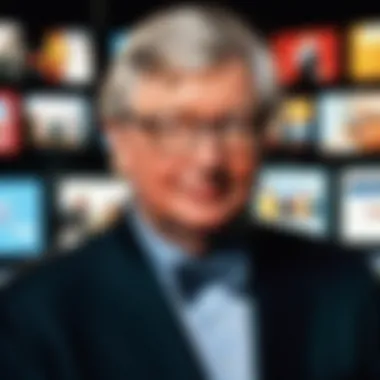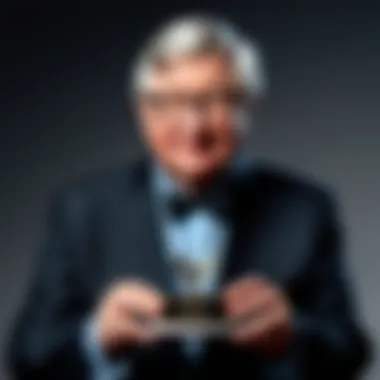The Legacy of Roger Ebert: A Deep Dive into Film Criticism


Intro
Roger Ebert stands out as a towering figure in film criticism, leaving an indelible mark on both cinema lovers and the broader cultural landscape. His ability to articulate thoughts on film, paired with an approachable, engaging style, set him apart from his contemporaries. Throughout his career, Ebert carved a path from humble beginnings to international acclaim, insightful enough to capture the essence of a movie while maintaining the feelings of its audience.
This exploration intends to unpack not just Ebert's career milestones but also how he continually evolved with the film industry. From the critical changes in how films were reviewed to his relationship with technology and film itself, every aspect of Ebert's legacy contributed to a richer understanding of cinema. His influence persists beyond his lifetime, ensuring that modern audiences still find relevance in his insights.
What lies ahead is a detailed investigation into the legacy of a man whose passion for film revolutionized movie reviews, shaped film culture, and connected viewers to the magic of storytelling.
Technology Insights
While Roger Ebert primarily focused on film, his career intersected with technology in ways that are notable. His eagerness to embrace new media made him a pioneer not only in film criticism but also in navigating the evolving landscape of technology in communication.
Latest Tech Trends
Ebert was not just a film critic; he was a forward thinker who understood the importance of technology in disseminating information. He utilized platforms like his own blog and social media accounts to reach a wider audience beyond traditional print media. By doing so, he engaged with viewers in real-time, allowing them to discuss films as they were released. This technique was revolutionary and contributed significantly to the way film criticism evolved, offering immediate public engagement.
Innovative Approach to Film Critique
His innovative approach led to a broader discussion of film aesthetics and narrative structures. Ebert's reviews were often accompanied by an analysis of the technology used in filmmaking. He would explore how advancements—such as CGI or sound design—enhanced the cinematic experience. While technology underpinned much of filmmaking's evolution, Ebert elevated its discussion to a level that encouraged audiences to appreciate the intricate blend of art and technology.
“The movies are like a machine that generates empathy.” - Roger Ebert
Influence on Digital Platforms
Ebert's reviews on websites like RogerEbert.com have continued his legacy, showcasing a modern-day critique of films in the digital age. His influence continues through the voices of a new generation of critics who express their thoughts across platforms like YouTube and social media. Platforms that Ebert himself used to broaden the reach of his commentary.
Entertainment Highlights
Examining the lasting impact of Roger Ebert wouldn't be complete without recognizing his role in shaping modern film criticism. His ability to connect personal anecdotes to the films he critiqued allowed readers to find shared experiences in the sometimes esoteric world of cinematic art.
Iconic Movie Reviews
Ebert's reviews varied from blockbuster hits to timeless classics, capturing the essence of what made films resonate with audiences. He championed both widespread favorites and indie films, fostering an appreciation that transcended conventional critical boundaries.
Celebrity Narratives
Moreover, Ebert had a knack for delving into the surrounding narratives of those involved in film production. His interviews often revealed the human side of filmmaking, shedding light on the trials and triumphs of actors, directors and others behind the scenes.
Ebert's voice remains a guiding light in a rapidly evolving entertainment landscape. His passion and insights encourage audiences today to look deeper into each frame and to appreciate the artistry behind the film-making process. As the cinematic world continues to flourish, the relevance of Ebert’s work endures, reminding us of the profound connections between audiences and the art of cinema.
Prologue to Roger Ebert
Roger Ebert stands as a pivotal figure in the realm of film criticism. His contributions went beyond simple reviews; they fundamentally altered how audiences engage with and interpret cinema. This section will outline the essentials of Ebert's influence, revealing his evolution from local writer to a beloved critic known worldwide. The significance of Ebert’s work can be perceived not only through his adeptness at identifying cinematic merit but also in how he played a role in shaping the collective conversation around film.
Exploring Ebert's journey uncovers his robust ability to balance personal insight with critical scrutiny. He was a voice that echoed the thoughts and reactions of countless moviegoers, reflecting their experiences in a way that was both articulate and relatable. It is essential to understand his background, career beginnings, and the influences that shaped his unique perspective, setting the stage for his remarkable achievements.
"Sheer intensity of emotion is what I look for in a movie. If it engages me on a human level, it has earned its place in my heart."
A Brief Biography
Roger Joseph Ebert was born on June 18, 1942, in Urbana, Illinois. Growing up in a family that often engaged in discussions about literature and cinema, Ebert's passion for storytelling emerged at a young age. Though he initially embarked on a path toward journalism at the University of Illinois at Urbana-Champaign, it was his fascination with films that ultimately took center stage. Ebert's career as a film critic began in the late 1960s when he served as the film critic for the Chicago Sun-Times. His keen observations and candid reviews quickly garnered attention and admiration.
Throughout his career, Ebert penned thousands of reviews, becoming the first film critic to win a Pulitzer Prize for Criticism in 1975. His sparkling prose and unerring eye for detail made his assessments resonate with readers. Beyond his written work, Ebert's role in television—most notably through the program "Siskel and Ebert"—catapulted him into the national spotlight, defining film criticism for generations.


Early Influences and Interests
Ebert's formative years were filled with various cultural influences that inevitably shaped his worldview. Notably, he reveled in the works of classic filmmakers such as Ingmar Bergman and Federico Fellini, whose storytelling approaches tapped into the complexities of the human condition. His early exposure to literature, coupled with a solid foundation in journalistic principles honed during college, laid the groundwork for his distinctive analytical style.
Aside from formal education, Ebert had a flair for writing from an early age. Compiling reviews and critiques, he began envisioning film criticism as a serious pursuit. This aspiration ignited his dedication to exploring the narrative threads and technical achievements of films. Ebert's ability to merge film with broader cultural conversations would later define his illustrious career, underscoring how films can resonate deeply within our lives.
Ebert's love for film sprang from more than entertainment; it stemmed from an understanding of cinema as a powerful narrative tool that could reflect society's values, challenges, and hopes. His life experiences and varied interests in literature and media allowed him to cultivate an insightful lens through which he examined films—setting the stage for the legacy he would leave behind.
Career Beginnings
Roger Ebert's ascent to the upper echelons of film criticism did not occur in a vacuum; instead, it was crafted through a series of pivotal experiences and trials during his early career. Understanding the significance of these early days provides a lens through which to appreciate the full arc of his professional journey. His foundation in local journalism, where he meticulously honed his wordsmithing skills, laid the groundwork for his later achievements and marked the start of his lifelong passion for cinema. In this sense, Ebert’s career beginnings are not just a prologue but a crucial component that illustrates how an ordinary local newspaper could nurture a budding critic into a national voice.
Entry into Film Criticism
Ebert's entry into film criticism was a combination of serendipity and hard work. While pursuing a degree in journalism, he began to write for the school paper, which ignited his interest in film review. His early work may have been somewhat under-the-radar, but it was characterized by eagerness and an unrelenting curiosity about films. What set him apart from his contemporaries was not merely his acute observations on the silver screen but his ability to relate those insights to a broader audience.
It was in 1966, after returning from a stint in the U.S. Army, that Ebert began writing for the Chicago Sun-Times. Here, he transitioned from the academic sphere into the real world. This period was marked by a fierce determination to establish himself and to find his own unique voice amid critique. His articulate assessments reflected a genuine enthusiasm and reverence for the cinematic arts, allowing him to connect with readers on a personal level. He wrote with a confidence that suggested he wasn't just sharing opinions; he was inviting audiences to join him on a journey through the film landscape.
Writing for Local Newspapers
Writing for local newspapers was more than a job for Ebert; it was an apprenticeship that shaped his critical lens. During this time, he wrote extensively about films, articulating analyses that were often deep and layered. Ebert's exposure to diverse genres and styles enabled him to flex his critical muscles, compelling him to consider elements that went beyond mere entertainment.
While local newspapers may not have had the allure of national publications, they offered Ebert the opportunity to experiment with his voice and style. He freely engaged in conversations about how cinema mirrored society, culture, and emotions, which resonated with a wide range of viewers.
Moreover, Ebert's writing was characterized by a tone that was both accessible and intelligent. He understood the value of balancing professional scrutiny with an everyman’s perspective. As a result, he nurtured a loyal readership that appreciated his straightforward critiques founded on genuine enthusiasm for film.
In summary, Roger Ebert's craft during his early career was vital in shaping his philosophy and style, leading to a lasting legacy in the world of film criticism.
Rise to Prominence
Roger Ebert's ascent to prominence in the world of film criticism is not just a personal journey, but a pivotal shift in the landscape of how films were perceived and discussed in America. During a time when film criticism was often relegated to niche publications or ignored altogether, Ebert carved out a space that made critical discourse accessible to the masses. His ability to bring complex ideas about cinema into vibrant conversations is a testament to the cultural role he played.
This section will explore key elements that contributed to Ebert's rise. In doing so, we will highlight the impactful moments that led to his national recognition, the unforgettable synergy with Gene Siskel that created a phenomenon, and his unique influence through television—a medium that bridged the gap between critics and everyday audiences.
National Recognition
Ebert’s career skyrocketed when he began to consolidate his work into a consistent voice, melding sharp analysis with a relatable tone. In the early 1970s, when his reviews began appearing in the Chicago Sun-Times, his insightful critiques on films like "Easy Rider" and "The Godfather" resonated well beyond the Windy City. This connection wasn't just about liking or disliking a movie; Ebert managed to articulate the deeper layers imbued within cinematic narratives.
His writing cut through the clutter, allowing readers to appreciate film as an art form worthy of serious thought and discussion. The increasing space given to his work placed Ebert in the sights of national publications, where his presence would soon grow indefatigably. As his reviews made their way into syndication, they found a wider audience, transforming him into a household name among film enthusiasts.
The 'Siskel and Ebert' Phenomenon
The partnership with Gene Siskel was nothing short of remarkable. This duo’s contrasting yet complementary viewpoints created an engaging dynamic that viewers craved. Their program, "Siskel and Ebert at the Movies," became the gold standard for film critique on television. The infamous thumbs-up or thumbs-down ratings system simplified the critical discourse for general audiences, giving it a universal touch.
This was not simply a show about movies; it was a cultural event where films were dissected and debated, giving rise to passion-driven discussions among viewers. Their rapport infused life into the analysis, presenting a blend of humor, candor, and rigor. This innovative format not only entertained but educated audiences, further solidifying Ebert’s voice in popular culture.
Television Impact
Television was a game-changer for Ebert. His charming presence made films and film discussions accessible in a way that print never could. Whether it was elaborating on groundbreaking special effects in "Star Wars" or dissecting the thematic depth of "Blade Runner," Ebert had a knack for engaging viewers with insightful, concise analyses that felt personal.
As viewers eagerly tuned in week after week, Ebert's reviews became a vital resource. He articulated sentiments that many felt but couldn’t express, allowing him to forge a deep connection with viewers. His candid assessments transcended superficial criticism; they were discussions intertwined with personal anecdotes, emotional reflections, and a sense of communal experience shared with the audience. In effect, he humanized the critique, breathing life into the analysis and fostering a culture that cherished film as more than just entertainment.
"Movies are like an expensive whore. You know they’re going to cost you, but you do it anyway."
– Roger Ebert


In summary, Ebert’s rise to prominence is a tapestry woven from the threads of national recognition, captivating collaborations, and the transformative power of television. Through this journey, he not only left an indelible mark on film criticism but also helped to elevate public perception of cinema itself. This intersection of eloquence and accessibility remains a significant legacy that resonates with both critics and moviegoers alike.
Writing Style and Philosophy
The significance of writing style and philosophy in Roger Ebert's work can’t be overstated. They are not mere embellishments but the backbone of his critiques. Ebert carved out a niche that combined accessibility with depth—a rare feat in film criticism. His prose often flowed like a conversation you might have with a well-read friend rather than an academic lecture. This approachable yet insightful style allowed readers from diverse backgrounds to relate to his insights.
Unique Voice in Film Criticism
Ebert's voice in film criticism was as distinctive as a filmmaker's signature. While many reviewers fell into the trap of using overly technical jargon or stiff formalities, Ebert maintained a clarity that spoke to everyone. It was this unique tone that resonated with both casual moviegoers and serious cinephiles. His ability to convey complex ideas about film in everyday language made his reviews immensely popular. For instance, he often used vivid metaphors that painted a picture in the reader's mind—comparing a film's pacing to a dance, for example. Ebert’s individuality was not just in his subjects, but in how he expressed his thoughts.
Balancing Personal Opinion with Critical Analysis
A hallmark of Ebert's approach was his ability to merge personal opinion with analytical critique. He wasn’t afraid to share his preferences or emotional responses, yet he grounded his impressions in a framework of critical analysis. This balance allowed readers to trust his judgment while also feeling liberated to form their own opinions. For example, when discussing a film like The Tree of Life, he might delve deep into themes of existentialism while still admitting how it personally affected him. This duality—claiming one’s subjectivity while also engaging in rigorous critique—set Ebert apart.
Emphasis on Emotional Resonance
Ebert understood that film is, at its core, about feeling. He consistently emphasized emotional resonance over technical prowess. For him, a film that stirred emotions, regardless of its budget or special effects, was worth discussing. His reviews often reflected a sensitivity to how movies moved people and why. When critiquing Schindler's List, Ebert didn’t just analyze its cinematic techniques; he fundamentally recognized the film's capacity to evoke empathy and betrayal. This focus on the emotional core of cinema allowed readers to appreciate films on a more profound level, elevating them beyond just visual spectacles.
"A great film can change the way we see the world; it can resonate in the minds and hearts of its audience long after the credits roll."
In summary, Ebert's style and philosophy created a rich tapestry of accessibility and insight, ultimately shaping modern film criticism. He demonstrated that one could be both a knowledgeable critic and a heartfelt viewer, showing audiences that cinema is not merely art but an emotional journey.
Impact on Film Culture
The influence of Roger Ebert on film culture extends far beyond the pages of his reviews. He carved out a space where film criticism wasn't just about recounting the plot or analyzing the technical aspects; it became a discussion on societal themes, emotional impacts, and personal connections. Ebert's approach to film as an art form opened up new avenues for filmmakers and audiences alike, shaping how films are produced, perceived, and discussed.
Influence on Filmmakers
Ebert's written word held significant sway over directors, writers, and producers. His reviews often offered insightful commentary that could elevate a film's profile or, conversely, diminish it. Filmmakers such as Martin Scorsese, Steven Spielberg, and Quentin Tarantino have noted how Ebert’s observations influenced their own work. By emphasizing storytelling and the emotional core of a film, he encouraged directors to invest more into the narrative rather than solely focusing on visual spectacle.
For instance, Ebert's championing of smaller, independent films like "The Blair Witch Project" encouraged a wave of low-budget horror films that tapped into the genre's psychological aspects rather than relying on high production values. His reviews lifted these films into broader conversations, proving that financial investment isn't always a marker of artistic merit.
Shaping Audience Perspectives
One cannot understate how Ebert reshaped the way audiences engaged with cinema. He possessed the unique ability to connect with viewers on a personal level, articulating thoughts that resonated deeply with everyday filmgoers. His famous thumbs up or thumbs down became more than just a rating system; it embodied the emotional weight of a film's reception and heavily influenced audience choices. This interactive engagement led to a more informed and passionate fanbase that wasn't simply consuming films but critically evaluating them.
Moreover, Ebert's commitment to exploring varied genres and underrepresented narratives fostered a sense of inclusivity in film appreciation. His reviews often highlighted voices and stories from diverse backgrounds, fostering a broader cultural literacy among viewers. Instead of subscribing to the mainstream box office release, audiences grew curious about the rich tapestry that cinema offered, understanding the potential for every film to provide a unique experience.
Contributions to Film Pedagogy
Ebert's conviction that film is a potent vehicle for education cannot be overstated. His writings served not just as critiques but also as teaching moments, offering lessons on cinematography, scriptwriting, and cultural commentary. Universities around the globe often reference his work in film studies, and his insights remain a cornerstone in understanding the evolution of modern criticism.
He was also an advocate for introducing film as a serious academic subject in schools. Ebert’s belief that understanding cinema could enhance critical thinking skills has guided educators to integrate film analysis into their curriculums. By championing the idea that films should be discussed in a structured educational context, he expanded the boundaries of how cinema can be taught and understood.
"Film is a mirror, a reflection of the human experience, and Roger Ebert showed us how to look into that mirror with curiosity and respect."
Challenges and Controversies
Roger Ebert's journey was not merely a parade of accolades; it was marked by significant challenges and controversies that shaped his narrative as a critic and a public intellectual. Understanding these aspects is crucial because they provide insight into Ebert's resilience and how he navigated the often tumultuous waters of film criticism. The controversies he faced not only affected his personal and professional life but also sparked broader discussions within the film community about taste, representation, and the responsibilities of critics.
Health Struggles and Adaptation
Ebert's fight against cancer is a significant chapter in his life, one that profoundly influenced his perspective on films and criticism. Diagnosed with thyroid cancer in 2002, he underwent multiple surgeries, ultimately resulting in the loss of his voice and the ability to eat normally. This could demoralize anyone, but not Ebert. Rather than retreating, he adapted his methods of expression. He transitioned to writing, pouring his thoughts into blog posts and social media, harnessing technology to bridge the gap created by his health issues.


Ebert didn't let adversity darken his outlook. Instead, he spoke about cinema with even more passion, often reflecting on life, mortality, and the art of storytelling in a way that resonated deeply. His candid discussions about his illness offered a new dimension to his critiques, making them more heartfelt and relatable – reminding audiences that the act of watching films is as much about sitting with one's emotions as it is about the art itself.
This adaptation signifies a profound lesson: even in dire times, creativity and expression persist. Ebert's steadfastness, amid his health struggles, opened new avenues of engagement for critics and audiences alike, leading many to reconsider how film criticism could evolve in the digital age.
Criticism of Ebert's Views
While Ebert's influence is undeniable, he was not without his critics. Many took issue with his perspectives on certain films, often arguing about biases or perceived inconsistencies in his ratings. For instance, his opinions on films like "The Passion of the Christ" and various indie films ignited passionate debates among fans and colleagues. Some labeled Ebert's style as overly sentimental, claiming it lacked the rigor and critical detachment expected from a serious critic.
Moreover, his outspoken views on political and social issues intertwined with his film analysis sometimes ruffled feathers. His critiques of gender representation and diversity, particularly in Hollywood, brought attention to issues that had long been overlooked, yet they also faced backlash from those who believed he overstepped his role as a film critic.
Ebert's defense against such criticisms was often rooted in a simple belief: film is more than entertainment—it reflects society. He saw his role as offering not just review but also commentary on the world around us. This openness to dialogue, despite harsh scrutiny, only underscored his legacy as a figure willing to challenge norms and confront discomfort.
In balancing his personal insights with critical analysis, Ebert showcased that even towering figures are not immune to criticism. His ability to articulate the complexities of criticism while remaining true to his vision is perhaps one of his greatest legacies, encouraging a broader, more inclusive discourse within film criticism.
Lasting Legacy
Roger Ebert's imprint on film criticism and culture remains indelible, long after his passing. His influence travels through the realms of cinematic appreciation, educational discourse, and the very language of film critique. Ebert wasn't just a voice; he was a bridge connecting filmmakers to audiences, a role that elevated film to high art and everyday conversation alike. As a key figure, he reshaped how films were viewed, appreciated, and critiqued, crafting a legacy that continues to inspire and challenge contemporary discourse.
Posthumous Recognition
Even after his death in 2013, Ebert's influence seems to only grow. Various awards and recognitions commemorating his legacy began cropping up, ensuring his contributions to film culture are celebrated. Organizations like the Online Film Critics Society established the Roger Ebert Award for Excellence in Film Criticism. This accolade is a testament to Ebert's pioneering spirit, shining a light on critics who dare to make their thoughts as eloquent and meaningful as his.
Moreover, Ebert's writings, both in print and online, continue to engage and educate new generations. His archives, available on various platforms like RogerEbert.com, serve as a treasure trove for film aficionados, offering insights that still resonate today. Many critiques have cited his work in their writings, proof of his far-reaching clout.
"No one can keep the film alive; it depends on the audience and how they feel about it. The critic's job is to articulate those feelings."
— Roger Ebert
Influence on Contemporary Critics
Ebert’s distinctive style—his blend of personal reflections with objective analysis—has shaped how modern critics approach film. He set the bar high for others in the field, encouraging a generation of film enthusiasts to express their views rooted in genuine emotion and insight. Critics today often draw from Ebert's principles, whether they fully embrace or actively challenge them,
His 4-star rating system is a staple in film critique, adopted by many but still linked back to Ebert’s unique perspective. Contemporary critics often reference Ebert's work to argue points, validate opinions, or inspire discussion, showcasing the interconnectivity he facilitated within the film community.
The Roger Ebert Film Festival
The Roger Ebert Film Festival, held annually in Champaign, Illinois, is a vibrant celebration of cinema that honors his legacy and vision. Funded by the Ebert Foundation, the festival provides a platform for filmmakers, critics, and enthusiasts to come together in appreciation of cinematic art. It showcases films that resonate with Ebert's ingenious spirit, often featuring works that might otherwise be overlooked.
This festival does more than just highlight films; it encourages dialogue about the medium, fosters community, and supports emerging filmmakers. The festival also reflects Ebert’s belief in the power of stories to inspire change, challenge norms, and cultivate empathy through shared experiences in cinema. It is a fitting tribute to a man whose life and work paved the way for deeper appreciation of the art form.
By engaging with Ebert’s ongoing legacy through public discussions and film screenings, attendees aren’t merely looking back; they're exploring the future of film in ways that Ebert would champion. Thus, the festival stands not just as a homage, but as an active participant in the ongoing dialogue about film and its role in society.
Culmination
The conclusion of this exploration on Roger Ebert solidifies his remarkable influence on film criticism and the broader cultural canvas. By revisiting Ebert's live and its milestones, we grasp the ethos he championed: the power of cinematic storytelling to evoke emotions, challenge perceptions, and spark critical discourse among diverse audiences.
Reflections on Ebert’s Contributions
Roger Ebert's contributions to film critique extend far beyond the pages of newspapers and screens of televisions. His incisive reviews and essays offered not just a critique of films but an examination of society, psychology, and human experience itself. Ebert had a knack for painting pictures with words, allowing readers to grasp not only the merit of a film but also its significance in relation to current cultural themes.
His belief in the emotional resonance of cinema was particularly revolutionary. Instead of simply dissecting a film's structure, Ebert explored how films affected audiences on a deeper, emotional level. He encouraged an appreciation for storytelling that prioritized real experiences and feelings over mere technical prowess. Through his review of "The Color Purple," he remarked on the film's ability to transcend cultural barriers, enriching conversations about race and gender.
Ebert’s storytelling approach transformed film criticism into a more holistic discipline. His essays often included personal anecdotes, reflecting on how certain films mirrored experiences in his own life or in society, bridging the gap between the critic’s viewpoint and the viewer's experience. This unique touch made Ebert relatable and accessible, drawing in readers who might not have considered themselves film buffs but felt acknowledged in his discussions.
Ebert's Continuing Influence
The lasting impact of Ebert's work continues to influence new generations of critics and filmmakers alike. His legacy can be measured in the vibrancy of film discourse on various platforms, including blogs, YouTube channels, and podcasting forums, where passionate individuals reclaim the spirit of criticism as Ebert defined it.
Critically, Ebert's methods have laid the groundwork for contemporary critics who intertwine personal narratives with film analysis. Many have taken cues from Ebert's style, integrating humor and humanity into their critiques. As the digital landscape evolves, the conversations he inspired are more alive than ever.
Moreover, initiatives like the Roger Ebert Film Festival promote his love for cinema and its power to initiate thoughtful dialogue. Each year, filmmakers and audiences come together to not only celebrate cinema but to recognize the critical role of a film critic championing artists whose work might otherwise go unnoticed.
In essence, as conversations about film deepen and evolve, Ebert's philosophy of film analysis continues to resonate within the industry and among cinephiles. His enduring influence reminds us that beyond entertainment, cinema serves as a catalyst for understanding the human condition, a message Ebert conveyed masterfully throughout his lifetime.







